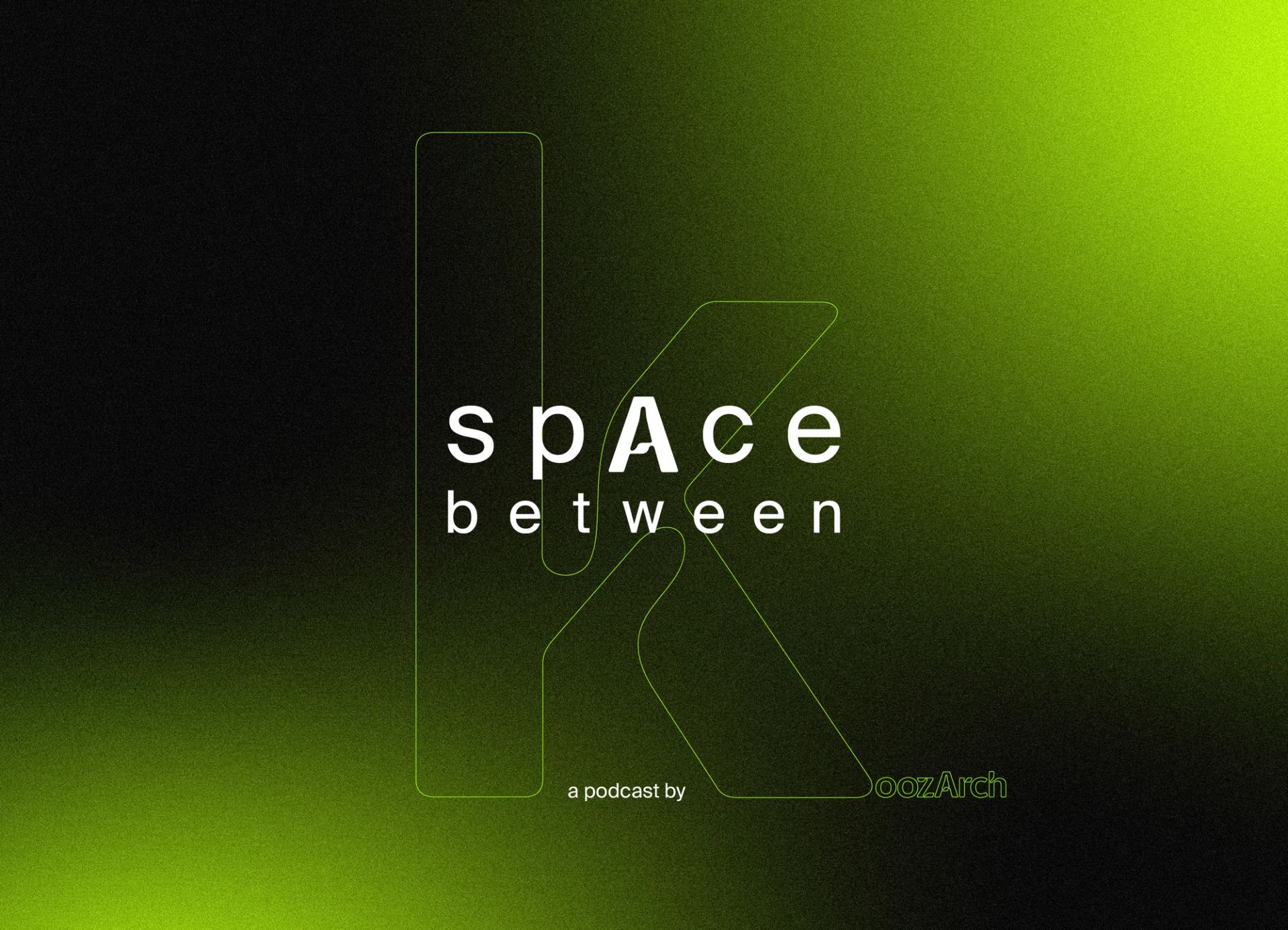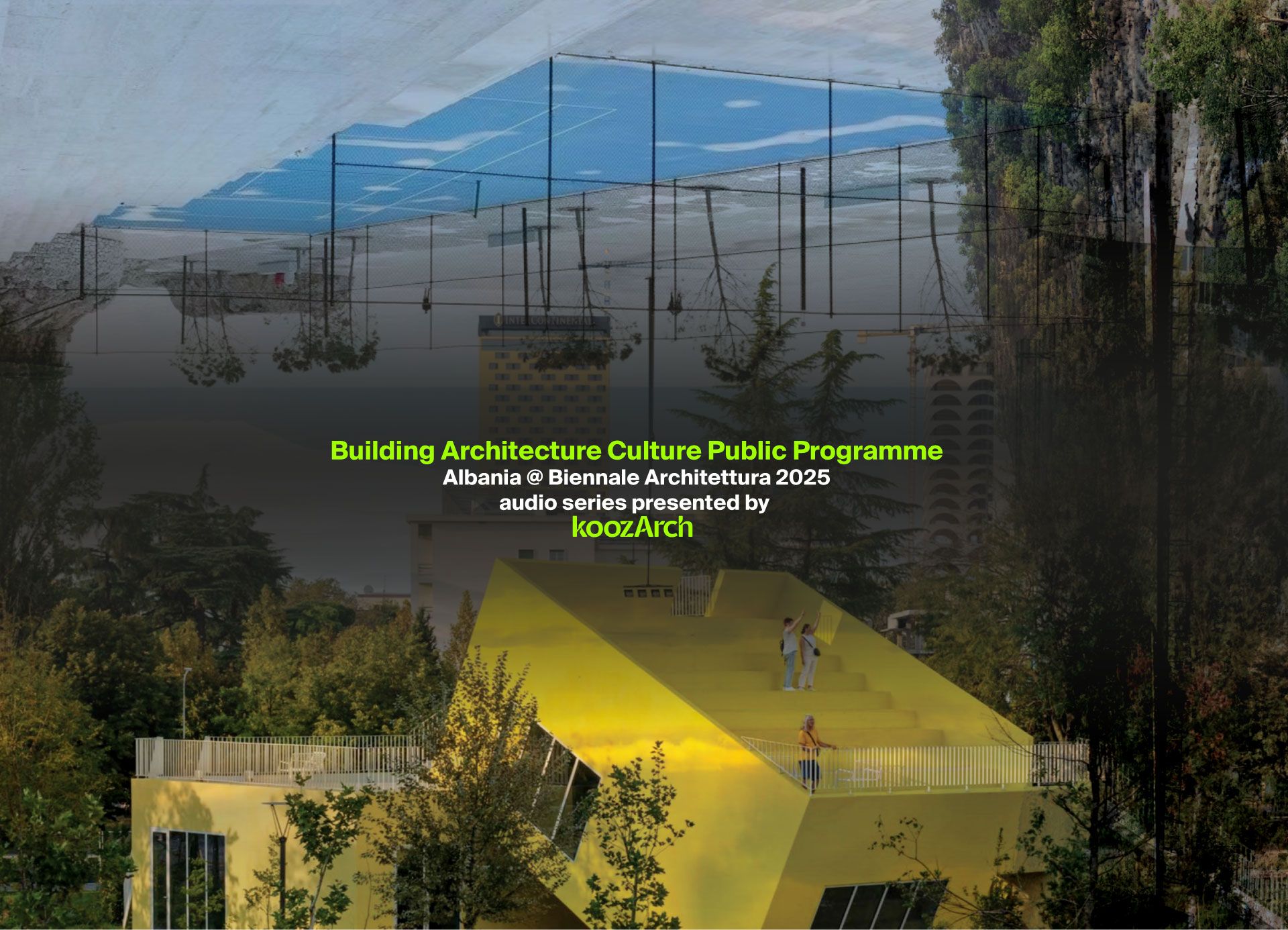On the occasion of the 19th international exhibition of Architecture at La Biennale di Venezia, KoozArch is delighted to present a new set of audio adventures, diving into a curated selection of spatial speculations, architectural proposals and curatorial visions. The 2025 iteration of the Venice Biennale — titled Intelligens. Natural. Artificial. Collective — gathers together a broad swathe of scientists, economists, agencies and expertise to supplement and inform new directions in architectural practice, in order to build more promising and sustainable futures. Listen along to learn more about the motivations, behind the scenes stories and inspiration ideas from this year’s Venice Architecture Biennale. You can listen to all episodes on Spotify and Apple Podcasts.
Episode 1 | Intelligens. Natural. Artificial. Collective.
In this first episode, we sit down with the curator of the 19th International Architecture Exhibition, architect and engineer by training, Carlo Ratti to indulge in his curatorial process and vision. Taking on the mantle of directorship for La Biennale di Venezia is no small feat; in this episode, recorded shortly before the opening, Ratti emphasises the chorus of voices brought together in his exhibition, from disciplines adjacent to and even seemingly removed from conventional architectural practice. By bringing together various forms of intelligence to inform the future of spatial practice, Ratti’s curatorial composition suggests ways in which architecture could foster a harmony of the spheres.
Episode 2 | Building Biospheres: Inside the Belgian Pavilion with Bas Smets and Stefano Mancuso
In this second episode, we focus on the Belgian participation. Titled Building Biospheres, the exhibition, commissioned and produced by the Flanders Architecture Institute and curated by the teams of Bas Smets and Stefano Mancuso, is a prototype for the ongoing research on the possible impact of plant intelligence on architecture, and more specifically on the indoor climate. The notion of plant intelligence is explored through the climatic environment within the pavilion, regulated entirely by plants and flora which communicate with digitally calibrated systems. A product of a ten-year long conversation, the premise of the project is to underline the paradigm that architecture should support life — beyond the human.
Episode 3 | Paraíso, hoje. (Paradise, today.): On the Portuguese Pavilion with Catarina Raposo, Giovanna Borasi, Manon Mollard, Nuno da Luz and Julia Albani
In this third episode of the series, we focus on the Portuguese participation in the Biennale. Titled Paraíso, hoje. (Paradise, today), the exhibition is curated by Paula Melâneo, Pedro Bandeira, Luca Martinucci and deputy curators Catarina Raposo and Nuno Cera. Challenging nostalgic or utopian ideas of paradise, Paraíso, hoje proposes paradise as a present and active condition—something to be reclaimed through collective responsibility, critical optimism, and dignified action. Specifically, in this episode we tune into the voices of landscape architect and deputy curator of “Paraíso, hoje.”, Catarina Raposo, Director and Chief Curator of the Canadian Centre for Architecture, Giovanna Borasi, The Architectural Review’s Editor-in-Chief Manon Mollard, and sound artist and publisher Nuno da Luz, moderated by curator, critic and communication strategist Julia Alban to discuss the concept of "paradise" in the context of environmental challenges and the importance of collective imagination in addressing these.
Episode 4 | Land Lores: soil stories from Latvia and Lebanon with Liene Jākobsone & Shereen Doummar.
In this episode, we are delighted to bring into conversation two national participations which include that of Latvia and Lebanon through the voices of Liene Jākobsone, co-curator along Ilka Ruby, & Shereen Doummar as part of the Collective for Architecture Lebanon. The two projects respectively titled “Landscape of Defense” and “The Land Remembers" address the land and the impact that ongoing wars are having on this, from Lebanon’s devastating ecocide to the fortifications which are being erected on Latvia's eastern border with Russia.
Episode 5 | Restoration, resurrection and redemption: the Holy See and Danish Pavilions with Tatiana Bilbao, Søren Pihlmann and Marina Otero Verzier.
In this episode of the Talks at the Venice Biennale, we are pleased to bring into conversation two national participations which include that of Denmark and The Holy See through the voices of Søren Pihlmann, curator of the Danish participation, & Marina Otero Verzier and Tatiana Bilbao, respectively curator and architect of The Holy See Pavilion. The two projects respectively titled ”Build of Site” and “Opera Aperta" explore the importance of the material, ecological and social repair of our built environment to ensure the creation of more sustainable and inclusive architectural interventions.
Bios
Julia Albani is a Lisbon-based curator, critic, and communication strategist. With a background in Art and Architecture History, she has been active in editorial and curatorial practice, communications, and public relations in the context of exhibitions, conferences, and publications since 2003. Since 2016, Albani has collaborated with the Canadian Centre for Architecture (CCA) to strengthen the institution’s international presence. As Associate Director of Communications, she has led the CCA’s international public relations from her European base in Lisbon since 2018.
Tatiana Bilbao is an architect and the founder of Tatiana Bilbao Estudio which she founded in 2004 to integrate research, design, community strategies, and responsible construction to address diverse circumstances including reconstruction and crisis scenarios. Bilbao teaches at Yale University and was recently awarded an Honorary Doctorate by the Boston Architectural College.
Giovanna Borasi is Director and Chief Curator of the Canadian Centre for Architecture (CCA) in Montreal, Quebec, Canada since 2020. She first joined the CCA as Curator for Contemporary Architecture in 2005. Borasi was educated in architecture at Politecnico di Milano, and has worked as a writer and editor in addition to her curatorial activities.
Shereen Doummar is a graduate of the Architectural Association and the laureate of the Renzo Piano Building Workshop bursary. She previously worked with Studio Jenny Jones, REAL Foundation, and Zaha Hadid Architects in London, and REX in New York. She is also the Co-Founder of Collective for Architecture Lebanon, the curators of the Lebanese Pavilion at the Venice Biennale 2025. Collective for Architecture Lebanon (CAL) is a non-profit organisation co-founded in 2019 by Shereen Doummar, Edouard Souhaid, Elias Tamer and Lynn Chamoun. It aims to create a cross-disciplinary platform for discussion and debate between the fields of architecture, design, urban planning, and the humanities.
Liene Jākobsone is PhD, architect, designer, founding partner of the Riga-based architecture and design studio SAMPLING and senior researcher and director of the Institute of Contemporary Art, Design and Architecture at the Art Academy of Latvia. She lectures at various universities of Europe and works on research projects both locally and internationally. In her creative practice, she oversees a range of projects, including building projects, as well as interior, adaptive reuse, exhibition and product design.
Nuno da Luz is a sound artist, publisher and researcher whose work circumscribes both aural and visual in the form of installations, performances, and printed matter. Grounded in attentive listening as an eco-sensible methodology, his practice undulates between the ecologies and pedagogies of noise-making, and bookmaking through the publishing collective ATLAS (Lisbon). Recent projects include solo show ‘Airs’ at Galeria Vera Cortês (Lisbon, 2024); group show ‘Feral Ballads’ at Cité internationale des arts (Paris, 2024); the monograph ‘Poetry as an echological survival’ (Lisbon/Porto: Sistema Solar/UCPress, 2022); and the LP ‘Beasts of Gravity’ in collaboration with Joana Escoval (London: The Vinyl Factory, 2019).
Stefano Mancuso is one of the world's leading authorities in the field of plant neurobiology exploring the signaling and communication of biological organization. He is the founder of plant neurobiology, is professor at the University of Florence and has published more than 300 scientific papers in international journals.
Manon Mollard is an architect, writer and Editor-in-chief of The Architectural Review. She is a graduate from the AA School of Architecture and currently lives and works in London. Beyond the AR, she writes for other international publications, is a guest critic at architecture schools and has recently collaborated with institutions such as the Royal Institute of British Architects, the Trienal de Lisboa, the Canadian Centre for Architecture, and the Schweizerisches Architekturmuseum in Basel.
Søren Pihlmann is an architect and the founder of the Copenhagen-based office pihlmann architects which he founded in 2021. The architectural philosophy underpinning his work emphasizes the potential of existing materials and resources, challenging how we continue to build by focusing on what we already have. This approach is exemplified by his recent transformation project Thoravej 29, which was awarded Building of the Year 2024 in Denmark and reused 95% of the existing materials.
Catarina Raposo is a landscape architect (ISA) dedicated to practice, teaching, and research across the broad spectrum of Landscape Architecture. She is co-founder of Baldios, a landscape architecture studio. For the Lisbon Architecture Triennale, she curated Os Caminhos da Água (Open-House 2021) and co-curated the exhibition Landscape: Space, Ideology, and Action (2007). She contributed to the publication Portugal Património and to the AP magazine of the Portuguese Landscape Architects Association (2010-13).
Carlo Ratti is an architect and engineer by training. He teaches at the Massachusetts Institute of Technology (MIT), where he is the director of the Senseable City Lab, and at the Politecnico di Milano. Ratti is a founding partner of the architecture and innovation office CRA-Carlo Ratti Associati.
Bas Smets has a background in landscape architecture, civil engineering and architecture. He is the founder of the architecture and landscape practice Bureau Bas Smets whose projects vary in scale, from territorial visions to infrastructural landscapes, from large parks to private gardens, from city centres to film sets.
Marina Otero Verzier is an architect, researcher, and visiting professor at the Graduate School of Architecture, Planning, and Preservation at Columbia University, New York. She specialises in the relationships between architecture and digital infrastructures and resources such as lithium that sustain them. In 2022, she received the Harvard Wheelwright Prize. She studied at TU Delft and ETSA Madrid and Columbia GSAPP. In 2016, she received her Ph.D. from ETSA Madrid.
Federica Zambeletti is the founder and creative director of KoozArch. She is an architect, researcher and storyteller whose interests lie at the intersection of art, architecture and regenerative practices. Prior to dedicating her full attention to KoozArch in 2024, Federica collaborated with the architecture studio and non-profit agency for change UNA/UNLESS working on numerous cultural projects and the research of "Antarctic Resolution".





